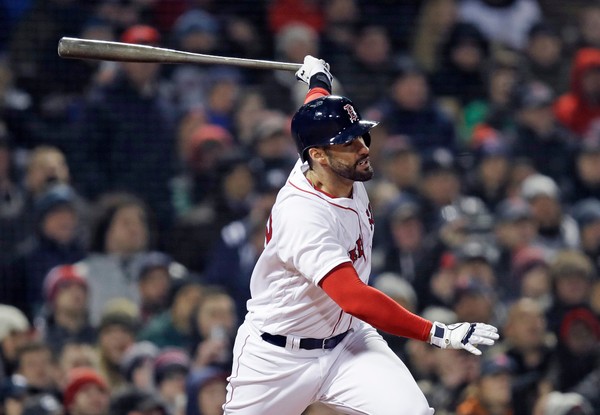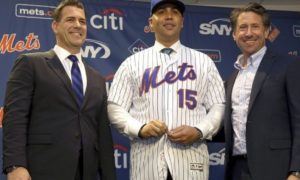On Designated Hitters and Pitchers in MVP Voting

The smoke has cleared, and the votes have been counted. We have our 2018 Most Valuable Players. In the American League, Mookie Betts easily won the award. He received 410 points to Mike Trout’s 265 and Jose Ramirez’s 208. Better yet, he nabbed 28 of 30 first-place votes.
In the National League, Christian Yelich (415) won by a similar margin over Javier Baez (250) and Nolan Arenado (203). He too captured the most first-place votes (29 of 30). NL Cy Young winner Jacob deGrom received the only other first-place nod.
The top three finishers in each league are considered “finalists” for the award. This isn’t to say others on the list aren’t worthy of mention. In the AL, Alex Bregman, Francisco Lindor, and Matt Chapman also received 100 or more MVP vote points. In the NL, Freddie Freeman, deGrom, Paul Goldschmidt, Lorenzo Cain, Trevor Story, and Matt Carpenter were so distinguished.
There’s one more individual on this list I left out intentionally. He served primarily in a capacity relevant only to the American League. Of course, that’s the designated hitter, and for AL MVP voting purposes, that means J.D. Martinez.
Martinez garnered 198 votes, narrowly beaten out by Ramirez for 3rd place and narrowly beating out Bregman for fourth. His credentials are impressive. Martinez finished tops in the AL (and all Major League Baseball) in runs batted in. He was second to Betts in batting average and Khris Davis in home runs. He was also third in on-base percentage and OPS.
Despite these ranks, J.D. Martinez was not a finalist for the AL MVP award. There’s no offense meant to Jose Ramirez, who had another fine year and seems to be only getting better. That Martinez had legitimate aspirations for a Triple Crown makes this all even more confounding, though.
If we choose to split hairs, we can find areas where Ramirez’s 2018 performance exceeds Martinez’s. Obviously, Ramirez’s 34 stolen bases well surpasses Martinez’s six. In addition, in 578 official at-bats, Ramirez struck out a mere 80 times. Martinez, by contrast, had 146 strikeouts to his name, ranking in the top 20 of the American League.
The apparent knock on J.D. Martinez, though, is that he doesn’t play defense. Of the 150 games in which Martinez played, 93 of them had him in the lineup as a DH. Otherwise, he split time between left and right field. At a -1.4 dWAR according to Baseball-Reference, his defense didn’t exactly light the world on fire. Then again, it evidently didn’t hurt the Red Sox too much. They did earn the best record in the league and a World Series title. Perhaps, therefore, it is much ado about nothing.
Martinez lost points for something he didn’t and wasn’t expected to do. Ultimately, that’s a bit of a bitter pill to swallow. While Jacob deGrom still managed fifth in the NL MVP voting, he was probably hurt in his own right by only taking the mound once every five games. It’s roughly the same idea, and depending on your feelings, you may share my sense of frustration.
Deciding who is “most valuable” is understandably problematic, in that there’s no defining metric for informing one’s choice. Wins above replacement, ever popular, is one way to approximate an answer. By this standard, J.D. Martinez fails to measure up. Among AL leaders for WAR, he ranks but 9th at 6.4. By comparison, Mookie Betts clocks in at 10.9, Mike Trout is at 10.2, and Jose Ramirez is at 7.9. Even limiting the conversation to position players, Martinez only makes it as high as 7th. Limit it again simply to oWAR and Martinez still is no better than 5th, behind Trout, Betts, Bregman, and Ramirez.
Wins above replacement is not a new creation, even if some casual fans are less familiar with its use. As quantifying baseball evolves, we re-appraise our methods for doing so. Some might argue that judging players against replacement-level competitors may not be the best comparison. After all, WAR can reward players for simply showing up, especially when calculated over the course of a career.
In this respect, wins above average or WAA might be considered a superior metric. On this note, comparisons are harder to make. Going back to Baseball-Reference, WAA is measured by team and by all people who appear at a given position. Among non-pitchers, the highest rating is for Boston right fielders at 8.1.
Most of the plate appearances went to Mookie Betts, mind you—532 PA, to be exact—but next on the list is J.D. Martinez with 109 PA. The next highest WAA for RFs in baseball is the New York Yankees, who come in at 3.3. That’s quite a disparity. Even if we presume Betts is primarily the reason for the Red Sox’s advantage, Martinez’s hitting prowess muddies the waters.
Meanwhile, for designated hitters, Boston also reigns supreme at 2.2 WAA. Shohei Ohtani, Albert Pujols, and the Angels (1.6) rank second, while Giancarlo Stanton and the Yanks (1.4) come in third. Noting that Martinez made 100+ PA in right field, we should also consider that 200+ PA went to other DHs. Either way, these WAA DH numbers fall considerably short of, say, Oakland third basemen (6.4), LA Angels center fielders (6.3), or even Cleveland shortstops (5.5). By this token, Matt Chapman and Francisco Lindor could deserve more credit than they received in the MVP voting.
If these matters weren’t complicated enough, there’s also the team’s overall performance as a potential factor. Boston, Cleveland, Houston, the NY Yankees, and Oakland were all playoff contenders. Re Mike Trout, the Angels were not, and maybe that should hurt him in the voting more. For all we know, maybe it already did, at least next to Mookie.
Keeping Jacob deGrom’s fifth-place finish in the NL MVP in perspective, if he weren’t the Cy Young favorite at season’s end, how far might he have fallen with 10 wins on the lowly Mets? 9th or 10th? He likely needed that level of achievement to crack the top five, and perhaps is being undersold even so.
At the end of the day, though, and no matter what WAR, WAA, win-loss records, park factors, and other metrics might dictate, players like J.D. Martinez and Jacob deGrom sure pass the eye test as MVP candidates. How many clutch moments did Martinez have as a Red Sox this season? How many dominating performances did deGrom have without the benefit of run support as a cushion? As fans of each team will tell you, there’s no question these players are valuable—no matter what their position.
Going back to the DH, when it comes to Hall of Fame voting, viability for selection is a touchy subject. Since the American League adopted the DH in 1973, only Frank Thomas has been inducted playing most of his games as a designated hitter. Edgar Martinez remains on the ballot, and may yet get in, but has yet to cross that threshold.
Indeed, there’s a bias against the DH. A large part of this may be that some purists believe it shouldn’t exist. These same purists may point to pitchers like Madison Bumgarner who can rake. Meanwhile, they casually ignore the vast majority who take painfully bad swings striking out, but that’s another story. When it comes to the Cooperstown prospects of someone like David Ortiz, say, he has his detractors. They hold to notions that without the use of the DH, Ortiz’s lack of defense would’ve kept him off rosters and/or forced him into early retirement. Besides that, there’s the suspicion he used PEDs.
In an article for Vice from 2015, sports writer and host of the Infinite Inning podcast Steven Goldman talks about the absurdity of objections to designated hitters in the Hall of Fame, specifically David Ortiz. As Goldman expresses in closing, ultimately, baseball is more than a single number, and often greater than the sum of them. He writes:
There is no Hall of Fame; there is only a baseball museum. Museums tell stories, and David Ortiz was a key character in baseball’s. Carping about specialists like closers and designated hitters is adding boundaries to the indefinable at the expense of what matters. If the DH bothers you, well, if you care about that kind of thing then that is the kind of thing you care about. Let’s not confuse those concerns with baseball, or history.
I feel like this same kind of logic colors MVP voting as well. Maybe I’m looking at the voting through a revisionist lens having seen Boston capture a championship. Still, it feels wrong not to have J.D. Martinez as a finalist. As a Mets fan, I’m also biased in favor of Jacob deGrom. There’s no question, though, that he was most valuable to a squad plagued by injuries and devoid of playoff hope. His season was the real bright spot of 2018 for fans, with Brandon Nimmo’s emergence being a distant second. And I don’t care that he won the Cy Young. Winning one award shouldn’t have a bearing on the other.
Maybe the true answer to the question is simply to allow for more finalists in the MVP voting. Like how the Oscars expanded to allow for ten Best Picture nominees, the MVP voting could allow for five finalists. In this instance, Martinez and deGrom would have been included. Otherwise, it could be not to care and to accept that all awards of this sort are arbitrary.
Regardless, it only seems fair that players like J.D. Martinez and Jacob deGrom receive their due. Mookie Betts and Christian Yelich were well deserving of their wins, but these other players should at least be in the conversation.
-Joe Mangano


















